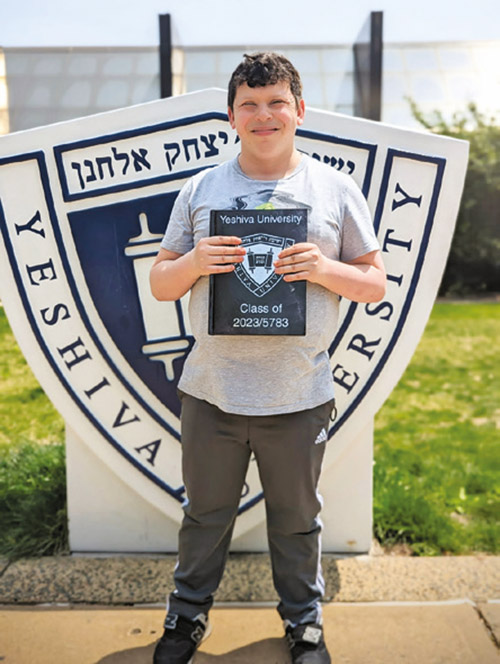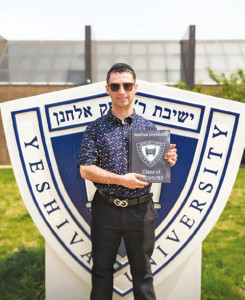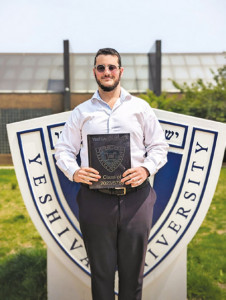
Two weeks ago, I attended Yeshiva University’s graduation at Madison Square Garden. During this moving celebration, former classmates popped by to say hello. At first, each buddy would ask me, “Is your sister graduating? What’s your connection to this year’s graduation? To each familiar face, I provided the same response: “I teach at YU’s Makor College Experience program. It’s a program that gives adults with developmental or intellectual disabilities an opportunity to take their own specialized course on YU’s campus. I’m here to watch three of our students graduate.”
At the graduation, Akiva Sasson, Simcha Avigdor and Yonah Gutnick said farewell to our beloved Makor program. Over the years, observers around YU have watched graduates transform from boys to men. Before the curtain closes on Akiva, Simcha and Yonah’s Washington Heights career, I would like to offer readers a glimpse into the tremendous impact they’ve had on fellow students and faculty.
Akiva Sasson hails from Lawrence, New York. After graduating from HAFTR High School, Akiva enrolled in Darkanyu’s gap year program. Darkanyu’s Israel program gives adults with specialized needs an Israel-for-the-year experience. It operates on Yeshivat Gush’s campus in Alon Shvut. Following three years at Darkaynu, Akiva joined YU’s Makor program. For a few semesters, I taught Akiva Judaic studies.

During one class, Akiva and I had a passionate debate. It was the week of parshat Shemot. That day, I shared with my class the story of Moshe, and the Egyptian who whipped a defenseless Jew. After reading this story, I started to rave about Moshe’s courage to stand up for justice. However, Akiva offered a different response. “Yosef, how did Moshe know the man was guilty? Maybe he was just having an angry episode? How could he kill him? There was no trial, no evidence. He just killed him.” This response led to a discussion between Akiva and me that lasted close to 10 minutes. It may have been one of the most exciting teacher-student discussions I ever experienced.
During one Shabbat lunch, a woman from the Washington Heights area offered me interesting teaching advice. “Try to have lunch with your students. People will show you different sides of themselves outside class.” Inspired by her advice, I started to grab lunch with students. Once every six weeks, Akiva and I would get lunch. At these sit-downs, we would do one of five things: hock about sports, kosher restaurants, Torah or Israel, or share personal challenges. In a way, Akiva represents the ideal lunch partner. He likes to share food, especially fries, and is always down to schmooze about a broad range of topics. At one memorable lunch Akiva and I spent 15 minutes revealing our smartphone habits. Another time, Akiva taught me about Purim in the Five Towns. Apparently, one guy rents an ice cream truck every Purim and distributes free ice cream to all.
In addition, Akiva does a great job at showing kavod harav—respect for rabbis. For example, whenever he mentions a rabbi to me, he says things like, “Hagaon Rav Neuberger is a special person, Hagaon Rav Willig is very holy, Hagaon Rabbi Yitzhack Cohen is a gadol. Hagaon Rabbi Hersechel Schachatar shlita is a very holy person.” Being around Akiva inspires others to show all rebbeim more respect. Under the guidance of family, rebbeim and mentors, Akiva hopes to continue growing in his connection to Hashem.
Simcha Avigodor hails from Toronto, Canada. At the age of 22, Simcha moved away to Brooklyn and joined YU’s Makor program. For each day of Makor, he commuted from Brooklyn to Washington Heights. This schlep would prompt most people to complain about their commute to classmates. But Simcha never complained about being tired or the long subway rides. Before class, I would ask Simcha, “How are you doing?” He would always respond with a quick “Good.” Sometimes, he would say, “I’m tired,” but he never said this out of frustration. Simcha’s ability to remain calm amidst this frustrating commute should inspire us to withhold complaints about our work or school commute. At least we have a job to go to. At least we have a school to attend.

After school, Simcha dedicates time to Torah learning and chesed. Each night, Simcha learns Torah on the phone with several chavrutas. A few years back, Simcha asked me to learn with him. To this day, Simcha and I learn for 15 minutes once or twice a week. In addition, Simcha dedicates time to others. For example, he takes buses around Brooklyn to visit a former Makor classmate named Avrumi Mermelstein at Avrumi’s group home. Avrumi and Simcha also talk on the phone every couple of weeks. Each visit and call gives Avrumi immense chizuk. Simcha’s actions echo Rabbi Netnael Weiderblank’s famous advice: “The best thing you can give someone is your time.”
Unlike most, Simcha Avigdor dreams big. During each year of Makor, Simcha developed a different dream job. At one point, Simcha wanted to be a pilot. Another year, Simcha wanted to become an accountant. Intellectual obstacles may bar him from accomplishing either goal. But Simcha continues to shoot for the stars. The words “never” and “not for me” don’t belong in Simcha’s vocabulary. The Kabbalah famously says, “Ain davar omed bivnei hartzon.” “If a person really wants something, nothing will stop them from getting it.” Under the guidance of Dr. Glicksman, Simcha hopes to find a job and jumpstart his adult life.
Yonah Gutnick hails from Melbourne Australia. Several years ago, Yonah moved to Crown Heights and joined YU’s Makor program. Being from the Land Down Under and Crown Heights equipped Yonah with a unique sense of humor. For example, he finds it funny to offer contrary responses. If I say, “Hillel the rabbi was patient,” Yonah might respond, “No, he’s not.” If I say anything with confidence, Yonah might deny it, or state that the opposite is true. Additionally, Yonah finds it funny to confuse staff members. For example, during the morning wakeup, I would knock on Yonah’s door and ask, “Is your roommate around?” In response, Yonah would sometimes reply, “He’s not here,” when he really was. At first, classmates and faculty were confused about Yonah’s humor. However, I have grown to understand and embrace Yonah’s shtick.
Over the years, Yonah and I have engaged in passionate conversations. These discussions usually take place on a stairwell during class breaks. Often, a stairwell schmooze would eventually turn into a dating talk. At some point in the conversation, Yonah would ask me, “Are you dating anyone? Why are you not dating?” After giving my answers, Yonah would typically respond. “It’s not good to be picky. You shouldn’t wait so long.” Besides dating, Yonah and I also discuss politics. One of us has strong views about the Israeli-Arab conflict and America’s former president. At times, Yonah became a soundboard for my interpersonal obstacles, whereas at other times, I became the soundboard for his political rants.
Yonah has immense passion for the State of Israel. Every day, he watches Israeli news videos and social media. On various Sundays, Yonah marched in the Israeli Day Parade and participated in protests connected with Israel. At the start of each meeting with Yonah, he will likely bring up Israel’s current events. At every Jewish wedding ceremony, singers recite several verses from Tehillim titled, “Im eshkachech Yerushalayim.” The song’s opening words state, “Im eshkachech, Yerushalayim, tishkach yemini. Tidbak lishoni, lichiki, Im lo ezkerechi.” Its translation means, “If I forget you, Yerushalayim, let my right hand forget how to work. Let my tongue stick to the roof of my mouth, if I do not remember you, if I do not set Yerushalayim above my joy.” More than anyone I know, Yonah has not forgotten about Yerushalayim. He devotes hours of free time to keep up with our country. Each of us should learn from Yonah’s appreciation of Israel and remain connected with our homeland.
In the future, Akiva, Simcha and Yonah will not run for president. Nor will they work as portfolio managers, doctors, dentists, psychologists, rosh yeshivas or pilots. But life’s about more than cool job titles and getting rich. It’s about using your unique skills to build a safer and better world. It’s about trying your best to make God proud. Staff at the Makor program have complete faith each of our graduates will fulfill both missions.
To our graduates, we hope each of you gets married. We hope each of you gets a job. We hope each of you makes Hashem proud. Go for your dreams and never settle.
Z, Shayne. S, Glicksman, Z, Meth. Y, Silfen. D, Tanner. Rabbi J, Shore. Rabbi M, Kaplan. Mr. Gadolowitz. Rabbi J Fabain.
In addition, the Makor College Experience would like to thank a few notable supporters of our program. First, we thank Rabbi Dani Rapp and his wife, Dr. Chaya Rapp. They have opened their home to our program for more than five Makor shabbtons. Thank you for your warm hospitality and amazing food. You guys throw the best Friday night meals around. We all hope to run a beautiful home like yours one day.
To quote Akiva Sasson: “We’re all holy Jews.”
To quote Simcha Avigdor: “I want a Tesla.”
To quote Yonah Gutnick: “I will move to Israel one day.”
To quote Rabbi Dani Rapp: “Shoot for the moon. Because even if you fail, you will have changed yourself in the process.”
By Yosef Silfen













